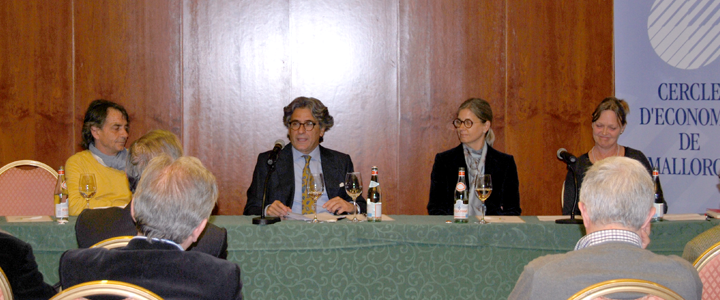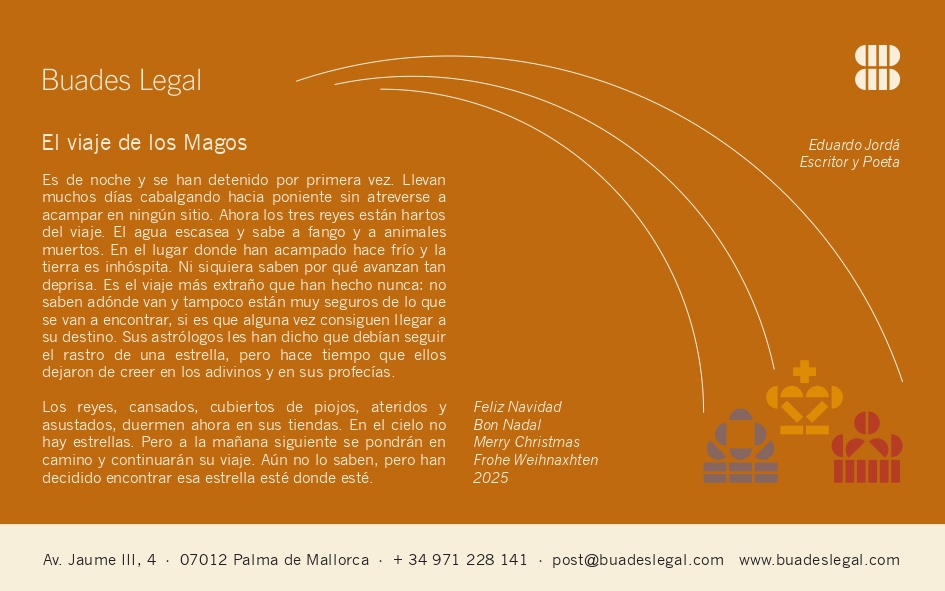
Child theme index:Franz Kraus: “The country people of Mallorca are the real gardeners behind the hotel industry”
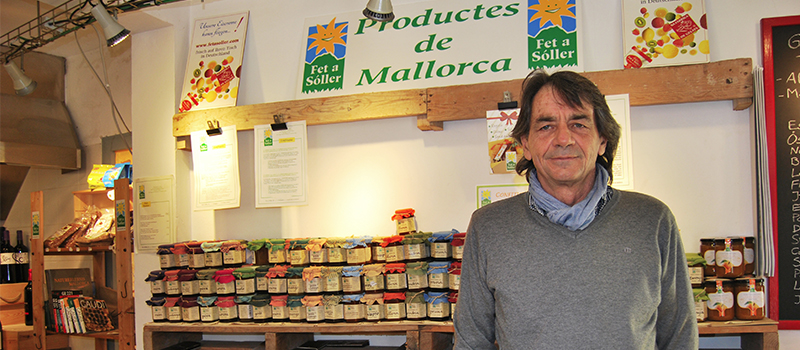
Interview with Franz Kraus, manager of Sa Fàbrica de Gelats and Fet a Sóller
Franz Kraus came to Sóller in the 90s. He opened “Sa Fàbrica de Gelats” with two employees and two years later he created “Fet a Sóller” which currently employs between 70 and 150, both directly and indirectly.
Franz studied in the United States and Germany, and after finishing his degree he worked as the manager of a multinational food company. He then moved to Sóller in order to work as a project consultant for a German company. Sometime later, he left the job to create the food factories. In this interview, Franz talks to us about his early days, projects, and why Fet a Sóller has become an unprecedented success as a company that emphasises the best of Mallorca’s countryside.
– Franz, what is it about Sóller… Why did you leave your native Germany?
– I had quite a lot of success in the food industry in Germany when I took the decision to move to Mallorca. I was always clear about the fact that I would have my own business one day. I came to Mallorca because I had met my wife and we made the decision to settle here. I also consider myself to be Latino, so I feel more at ease in the south of Europe than in the north. I have been here for 26 years, I really like the way of life here.
– What were the early days like in Sóller in the business world right in the middle of Serra de la Tramuntana?
– We had to tread very carefully. From the moment I arrived, I assessed the potential of Sóller, the riches that nature provides and what we could do. At the start, I spent 7 years working as a consultant for the agri-food industry in Europe. In 1994 I created Sa Fabrica de Gelats and in 1996 I set up Fet a Sóller. I began by myself, but now I have partners because the business is now too large to manage alone.
– Why did you start in the ice cream sector? Is it a passion or a business?
– I began in Mallorca for two reasons. Firstly, because I found a niche in the ice cream sector and secondly, because, in addition to being an economist, I am also an ice cream maker. Everything I know about ice creams I learned in my native Germany, because I worked there as an ice cream maker when I was studying.
– How did Fet a Sóller come about?
– Fet a Sóller is a marketer of Sóller’s regional products, but all over Europe. It originated as a concept for creating food products, not only ice cream, because ice cream, just like wine, is a product that is not essential, but which has its niche in the market. The ice cream is Majorca has always been a disaster and that is why I began to work with the two brands, and of course that forced me to leave my job as a consultant. We currently have 70 people that work with us and who are on our pay roll. We also have agreements with several companies -cooperatives- in Sóller, El Consell, and occupational workshops. In short, I would say that in total we have 150 people working for the company.
– How did your relationship begin with Bufete Buades?
– It was a coincidence. Juan Buades participated in a debate at the Economic Circle in Majorca. We met one another there and he told me that he was surprised to meet Germans that did not fit the normal stereotypical vision people have on the island.
– What do you attribute the success of your company to?
– No new company, apart from those that have a unique idea for the world, like Google, can reach a target alone. I think that, in order for a company to have success, the important thing is perseverance, knowledge and humility when you reach a goal. The creators are not the only ones that have success, so too do employees and lots of other people. It is like football; you need a solid team to progress. On the other hand, I think that the potential that Sóller had in this case, somewhat forgotten during Spain’s dark era, and also due to a lack of new paths, made me set my aim on involving everyone in the project. The knowledge was already there but it lacked a driving force to get things going. At the beginning I had to convince people to believe me, but I have demonstrated it especially because I trustworthy, and in society it is extremely important that people keep their word. I think that any business person has to create employment and over the last few years, we have created 50 jobs in a town like Sóller. Nobody from Mallorca works here, only locals, because in Sóller we are the “aliens” of Mallorca: we have to pay a toll tunnel, the most expensive in the world and that is like a border. Unfortunately, none of the parties that have governed have been able to free us of that border. Now it seems that the current government of Francia Armengol is going to free us, giving us free access to the rest of Mallorca, thus providing us with a normal way of moving around so that we can grow and hire employees from the rest of Majorca.
[roto lado=”left” texto=”in Sóller we are the “aliens” of Mallorca: we have to pay a toll tunnel, the most expensive in the world and that is like a border”]
– What advantage does your company have in relation to other multinationals and what is it like to compete with them?
– In our case, we are a group of food companies. I have a personal philosophy: food is a product that helps you to survive in life, it is not a product to fill your stomach. Multinationals want to fill stomachs and their pockets. I mean, food is the first medicine that we take each day. We are educating our clientele so that they always bear this in mind and remember that food is the first medicine that we supply our body with, and that anything we eat has to help our body to function, it is very straightforward. An example of this can be found in the marmalades that are produced and sold in supermarkets: they contain citric acid preservatives, pure chemicals, while we take the more complicated route because we use natural ingredients such as strong lemon juice. The other difference is that multinationals have more financial power, but at Fet a Sóller we have the support of suppliers because they view us as the saviours of their economy. In our case, we plan in the long term, over years, so that farmers have time to plan with the fixed income they will receive from their harvest. Before the harvest, farmers know the volume that will be purchased and the amount that they can earn. The price that we pay is higher than in the countryside of Valencia, for example. We do that because we have an underlying policy, which is to try and recover and defend the Mallorcan countryside so that it can have an added value for tourism, because if it doesn’t work there is no tourism. The country people of Mallorca are the real gardeners behind the hotel industry, our idea is to be more productive, we can also make a living within tourism while having quality. The word quality is very versatile, everyone talks about it, but what really is it? Our quality is about having a product that is suitable for the body, and not full of chemicals, that is quality. If we meet the expectations of consumers thanks to the taste, then we have perfect quality. Quality is poor for example, when you consume processed foods, that is poor quality because its only purpose is to fill your stomach and then illnesses emerge. Almost 95% of lemon ice creams from multinational companies have never come into contact with a lemon, they are just created with citric acid. At our company it is forbidden to use citric acid, when we sell lemon ice cream, it is flavoured only with real lemon.
– What advice would you give to someone that wants to embark on a business venture in Majorca? How do you create a formula for success?
– I have no right to sit and hand out advice, but if someone asks me, I would say that the first thing you need is humility. Secondly, before you open your mouth and say “in my country things are done in such a way”, you have to look at things first here, and assess the different way of doing things in Mallorca. When that person has got to know and taken a closer look at society, that is when they really learn. Ghettos are not good, we know that life in Mallorca is difficult but you have to make an effort to get to know it, and then only after doing that, I would advise investing. Mallorca is not the third world; we are in Europe.
– Currently, having a client is a treasure, what is the key to keeping them?
– A client is always an asset but the key question is who has access to the client. Companies have to work on the same level as their clients. You have to be honest, and tell the truth because if you tell lies the client will end up finding out. We now use the internet to work on international exportation. 50% of our direct sales are with our clients, I mean, everyone that thinks it is possible to work with platforms such as Amazon is wrong. In those cases, you don’t have access to the end customer, because Amazon manages everything and you always live with the fear of losing everything. It is essential for any business to have direct access to buyers, know when a client is happy or not, and what to do in each of those scenarios. Another thing that is important for any company is research and constant renewal in order to keep evolving.
[roto lado=”right” texto=” It is essential for any business to have direct access to buyers”]
– In a company with such an extensive trajectory, there must have been good and bad moments, what can you tell us about them?
– 99% of business people, especially at the start of the first 10 years, have to calculate that their idea will not work. They need to have a plan B or C in order to change the strategy when things are going badly. The key is knowing if you are going to survive or not. Survival is success. For many people money is success, but this is gratification. You may earn more than others but really, success is about surviving and being able to grow in markets where almost everything exists. Internet is something new that has been around for about 15 years, however for me it is like a pencil: it is not for selling, it is a path, a means, a tool, however the ideas and creations of markets have to be made by humans.
– Mr Kraus, what are your challenges for the future beginning with 2016?
– We have a plan for the next five years, each year we add one to the future plan. It is continuous, our goal for this year is to build the headquarters of our company. We invest money in order to have a decent infrastructure to use a base for business in the future, located in a town in Sóller with a freed tunnel that is no longer a border. Fet a Sóller is a Sóller-based company because our employees live here, but we are a Mallorcan company in an international market. 50% of sales come from the European Union and 50% come from the Balearic Islands. Our goal is to grow with quality, to create foods that are good for the body, for people that really want to enjoy a Mediterranean diet.
[roto lado=”left” texto=”Success is about surviving and being able to grow in markets where almost everything exists”]
– Is it profitable to invest in Sóller?
– Sóller, along with Palma, is the most historic and prettiest town on the island. This is thanks to the people of Sóller and their spirit, for the last 150 years, they have gradually created fortunes and invested them into making their town beautiful. What other town has a train, such a highly concentrated level of modern architecture, as well as people that are slightly crazy, different, international and liberal? That is the way people in Sóller are. However, at the same time it is difficult to live behind the mountains with a different climate and have the intellectual ability to speak different languages such as Mallorquín here, and Spanish…those are things that you cannot fake. Anyone that wants to invest here has to think about the way they are going to do so, namely, in a neo-capitalistic way or in line with social capitalism, thinking with their heart. In my case, I do everything with heart, I don’t understand success without heart. That is the greatest source of joy. I recommend that people who want to invest in Sóller do so humbly and tread carefully. Above all, they should learn the language, which is the same as what northern countries request of newly arrived immigrants. You have to learn the language here. I speak the language, even if I make some errors, but I am getting better every single day. You have to show an interest in the language, be able to communicate, because if you only speak English or German then you miss out on the cultural riches of the people here and will never be fully acknowledged by the people of Mallorca.
arse, porque si solo comunicas en inglés o en alemán pierdes la riqueza cultural de la población de aquí y nunca van a encontrar el agradecimiento de los mallorquines.
Andreu Rotger: “Foreign business people find it very difficult to set up here due to the red tape and the decisive handicap of the island’s regional framework”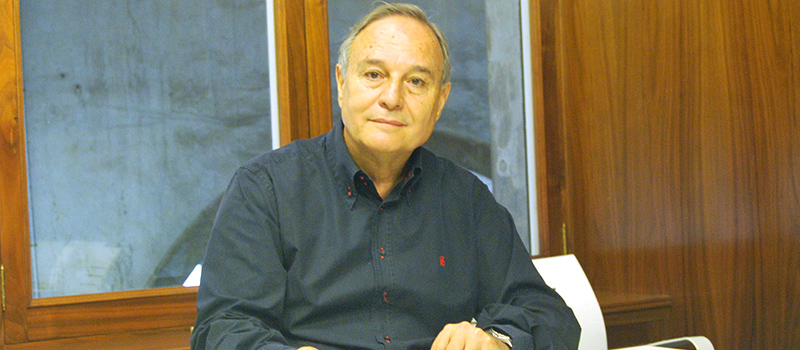
Interview with Andreu Rotger, chairman of the Cercle d’Economia de Mallorca
Andreu Rotger is the current head of one of the benchmark independent entities on the island as a result of its cooperation and involvement in revitalising and modernising economic life on the island, the Cercle d’Economia de Mallorca. Rotger (Alaró, 1949) is a civil engineer who is a keen supporter of the ongoing adaptation of production processes, both in private companies and in other areas of society in general. After beginning his career working on major infrastructures, dams, tunnels and roads, he spent a major part of his professional life in the energy sector, specialising in organisational development and change management. He finished off his career as Managing Director of Gesa-Endesa, a position which he held until 2011.
How would you rate this year as chairman of the Cercle d’Economia?
One of the most interesting things has been the work of the committees and particularly the work prior to the regional elections. This very interesting work was carried out across all the committees in order to see how we would like to be governed as citizens. We are an institution which is independent in both political and business terms, and we do not aspire to be a political party or to govern, but we do aspire to be able to express how we would like to be governed. That is why the Cercle d’Economia was host to all the leaders of the political parties, and it was extremely interesting to see the presentation of our work with regard to the future government and to check the position of each party with respect to the points we put forward. We were not interested in each political party coming to do a rally or a speech, what we wanted was to know their overall position with regard to socio-economic measures.
If anyone is unaware of the tasks of the Cercle, can you describe for us its main tasks in favour of the economy of the Balearic Islands?
We are not a forum made up exclusively of economists, as we cover a whole range of professionals who are truly keen to analyse, debate and contrast different thoughts in a pluralistic manner from the point of view of citizens’ multiple interests.
The Cercle is an independent institution that does not accept any grants from the government or from anybody else, and it therefore has no need to defend party or business interests. Based on that independence, our objectives can evolve depending on how society itself evolves. At this time, and unfortunately for quite a while now, one of the issues that most concerns us and takes up our time is our region’s system of financing, which is currently insolvent. The region has a debt of 9 billion euros, when the annual budget stands at a little over 4 billion euros, i.e., the debt is more than double the budget, and for many years now the region has not had the ability to generate a surplus and the debt interest has been eating away at our finances. We are therefore in an extremely complicated situation and our response is to argue for a fairer system of financing, and we have been working on this for quite a while and we continue to do so in order to bring out a civil society manifesto. Our hope and desire is that the civil society will support our manifesto demanding a fairer tax system. It makes no sense that a region which provides almost 6% of its GDP to other regions then has the lowest resources available in all of Spain to satisfy the same needs as the other regions. Something is clearly wrong, and the Cercle will continue to demand a change in the system of financing, not only relating to income but also with regard to expenditure. When a family or a company is in financial difficulty, it searches for new income but it also attempts to streamline its spending. We do not support cuts, but we do support efficiency; we cannot spend one single euro on anything that is not a priority and a necessity. In this regard, the WHO, for example, indicates that in Spain, and we suppose that the Balearic Islands are no different, between 20% and 40% of spending is inefficient. If this is the case, and we have no reason to think that this region is an exception in this regard, we must work on efficient ways to reduce spending, not only in health, but in all other areas, such as education, social services and all public companies so that the money collected from the taxpayers’ pockets is invested not only in a strictly correct way free from any hint of corruption, but also on a well prioritised basis.
What objectives has the Cercle d’Economia and its chairman set for the coming years?
At this time, and more than ever, we need a system of parties committed to consensus and to representing citizens’ interests and not their own party interests. We are concerned about corruption and the reform of the Electoral Law. But we are also concerned about education, indeed the Cercle d’Economia worked towards reaching a social agreement for education, the economic situation for employees, with over 50% of young people unemployed, and the extremely precarious employment conditions. To take an obvious example, 25% of contracts have a duration of one week or less. A responsible and democratic society must consider all these issues very seriously. The Cercle is in favour of consensus in the essential issues – health, education, employment and the economy – and who could possibly think that the first thing a party should consider when entering government is to repeal the laws of the previous government? And I am not saying this because of the situation we have seen in recent months. Considering the creation of a tourist tax thinking that the next government might repeal it is of no help at all to the economy and the system of this country. Citizens should require all political parties to show greater responsibility in this aspect, and I insist, all political parties.
On a more personal level, tell us about your experience as an executive and as a civil engineer and what you believe to be the main needs of the Majorcan business sector
I have had the good fortune to lead various projects, remaining on average no more than 4 or 5 years in the same project. This, together with the development of the private companies has allowed me to work on the merger of different companies. One of the most striking aspects, and one that I have had to learn a great deal about, is change management, which is currently a very topical aspect that requires a lot of work. In this regard, I believe, and this matches up perfectly with what we were saying before about the consensus of political parties, that a truly good employee must nowadays have a certain willingness to manage change and a marked capacity for adaptation.
A second aspect which from my point of view is essential in the current business context relates to efficiency and ongoing improvement. I have worked extensively in benchmarking, which is simply the process by which we analyse how things are done, now not only in your own house but also in everybody else’s, in order to compare yourself with the competition or with third parties and to take those with better results than you as benchmarks, analysing those who develop the best practices to then attempt to apply them in your particular context. It involves being permanently up-to-date with how others are improving and trying to apply and enhance the knowledge that you can deduce from what others are putting into practice. That attitude of humility and constant analysis is extremely interesting.
How would you describe your relationship with Bufete Buades? How far does it date back?
It is clearly because Joan Buades was the chairman of the Cercle d’Economia and therefore my predecessor, although not directly, and if it were only for this reason we would already have many things in common. In addition, the relationship with Bufete Buades, and specifically with Joan even at this time when he does not have a direct link to the Cercle, is good and we have sometimes asked for his cooperation and he has responded enthusiastically. For example, as a case in point, Joan Buades recently participated as the moderator in a panel discussion which we organised and which was attended by foreign business people resident in Mallorca, with an extremely interesting final result for the audience.
How do you interpret what might be the immediate future for the island’s economy?
We are living in the best of all worlds from a macroeconomic point of view, in the sense that having come out of a major recession we are basically sustained by the tourism sector and our competition is, in a manner of speaking, in worse condition for many reasons. This places us in a distorted situation, but also one which we have worked hard for because you get nothing in life for free. Nevertheless, the circumstances are in our favour and it would be a serious mistake just to stay where we are.
We are at a crossroads, I would say, because this is the perfect moment to change direction in some aspects: our GDP per capita is falling systematically, dropping from one of the highest incomes per capita in Spain to positions around the average. Productivity is falling and we have been more concerned about profitability, with an approach to the macroeconomy in recent years in which profitability has been placed above productivity. I believe that we need to turn to focusing on productivity, with more emphasis on R&D and education, which is something that is not happening at the moment. We spend 0.36 % on R&D, one of the regions in Europe which least invests in innovation (the one which invests most, a Belgian region, invests 7.8%). We are not doing too well in productivity and we are having many problems in education. A regional education minister from the People’s Party recently said that we are undergoing a national emergency in education, and we believe that we have a lot of work to do in this regard which needs to be carried out intensely and quickly so as not to miss the boat.
Our socio-economic model has evolved. It is necessary to know where you come from and not to disparage the great potential which the Balearic Region has, but it is clear that we need to diversify. However, we need to do so with intelligence and training, and that is why education is a basic pillar to drive everything in this regard.
Apart from the tourism sector, what sectors are undergoing greater growth and recognition inside and outside our islands?
The work has started, and an increasing number of people are showing interest in the positive signs coming from agriculture, health tourism and the innovation associated with scientific and technological entrepreneurs in fields such as medicine and biology. In an island such as ours, we cannot aspire to develop a large industrial sector, because it is relatively incompatible due to our size, but we can be optimistic about telephone and communication services and the strengthening of services for senior citizens, which is a very important field, both due to necessity and as a driver of change in the economy.
Has the Cercle d’Economia detected any increase in the interest of foreign capital in establishing its investments and businesses in Majorca?
I believe that we have a series of advantages and also of disadvantages. We need to know what they are in order to strengthen the former, and not to lose them, and to correct the latter.
The advantages of the Balearic Islands for European business people, and this is what they have told us in the Cercle, include the safety and quality of life enjoyed on this island, which do not exist almost anywhere else. In addition, as Utz Claassen recently said, it is the most European region of Europe as citizens from the entire continent live together here in an easy and natural manner. Nevertheless, we have some very significant unresolved matters, such as the red tape, as we have been told by the foreign business people we have spoken to. But it is not only them, a recent report places us as the fourth worst autonomous region for doing business based on four indicators: the amount of red tape and the time necessary to create a company; the same for changing a name or selling a company; also for carrying out a construction project (houses, hotels, factories etc), and the time necessary to connect to the electricity grid. In the first three indices, the Balearic Islands is among the three worst regions, and the overall calculation places it in the fourth from last position.
It is very difficult for business people in general, and foreigners in particular, to set themselves up here. In addition, we have a decisive handicap which is the island’s regional framework: we need to develop a regional financing system and a special framework for the islands. This last point should be aimed at removing the disadvantages for citizens and companies of living on an island, which almost creates a situation of unfair competition.
The surcharge for importing or exporting is very significant as it directly affects a company’s decision on whether or not to set up in a region, both for selling its products outside the region, and also if it needs to import raw materials. In the case of tourism, the only important thing is the customers, as the raw material – the sun and nature – are already here, which, of course, is not the case for most sectors.
Mallorca Zeitung celebrates its 15th anniversary at Mhares Sea Club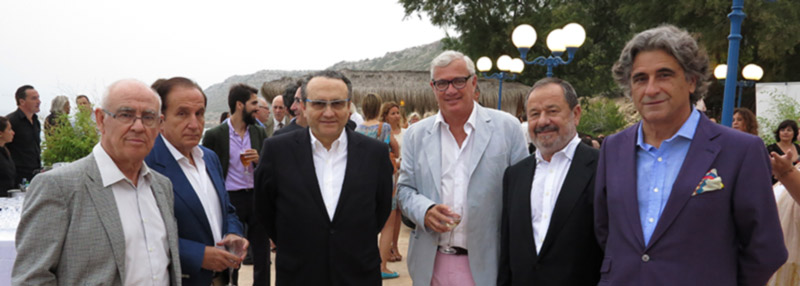
The German-language weekly, Mallorca Zeitung, recently commemorated its 15th anniversary surrounded by broad representation of Balearic society, the German community residing in Mallorca, as well as the readers, announcers, and the editing team that make possible the publication of the newspaper every Thursday.
The celebration took place at the Mhares Sea Club, located in the Puig de Ros neighborhood, with the presence of some of the most illustrious personalities of the island, including, among others, José Luis Roses, president of the Chamber of Commerce.
The event was presided over by Javier Moll, chairman of Editorial Prensa Ibérica and publisher of Mallorca Zeitung, who congratulated all of the shift staff for having converted it over these years into a point of reference among the German-speakers residing in the island.
In the name of the office, we were represented by our director, Joan Buades, accompanied by the attorneys Daniel Olabarria and Gabriel Buades.
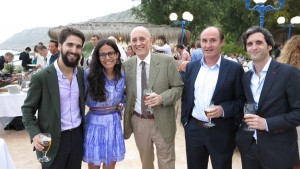
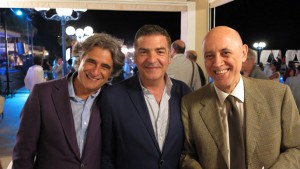
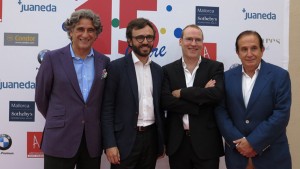
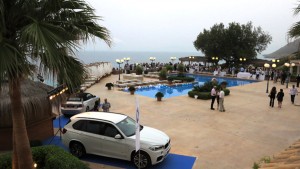
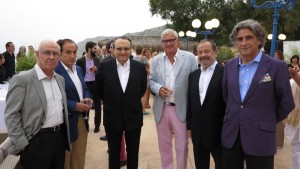
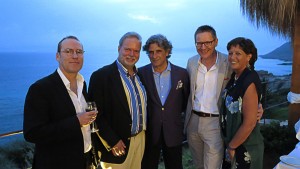
With Nosquedalapalabra.es, Bufete Buades takes the floor to give the right to speak, and the consequent value of discourse and the capacity of dialogue, the recognition deserved within any legal status.
Throughout history, countless major personalities have emphasized the transcendence of language and the power of discourse as unnegotiable elements for the progress of modern civilization. Nos queda la palabra attempts to recover some of this testimony that, with the accompanying facts and especially the means of expression, have contributed over the centuries to the progress of humanity.
This initiative is supported by the entire office team, the members of which have recorded a video in which each expresses his or her legal arguments about some of the current circumstances that affect their respective areas of practice.
“Mallorca is paradise, if you can stand it”“Empreses i empresaris” cycle organised by the Cercle d’Economia de Mallorca
With the enigmatic phrase “Mallorca is Paradise, if you can stand it”, which Gertrude Stein said to Robert Graves during an interview in 1929, which left its mark on the British poet as a few months later he docked in the bay of Palma with his family to remain on the island until the end of his life, the Firm’s director, Joan Buades, introduced Barbara Bergman, co-owner of Rialto Living, Camilla Alvérus, director and owner of Paloma Events and Franz Kraus, promoter and director of Fet a Sóller, in the “Empreses i empresaris” cycle, organised by the Cercle d’Economia de Mallorca, on the occasion of the conference held on 18 March this year in Hotel Valparaiso, which brought together several foreign investors who have been living for many years in Mallorca, where they develop and lead successful businesses and projects.
The Chairman, Andreu Rotger Amengual, invited Joan Buades to lead the roundtable, in which he participated actively.
The Cercle d’Economia de Mallorca is an association created in 1994 in response to the need to bring together civil society, contribute to its progress and to social well-being, integrating people and groups based on independence and the defence of general interests. It is a scenario for dialogue and discussion of a plural nature, and is essentially made up of liberal professionals, business people, university lecturers, business executives and senior civil servants. It currently has over 200 members and demonstrates a very noteworthy vitality and social presence. Joan Buades was one of its founders, occupying executive positions since its creation, and was Chairman of the Governing Board from June 2000 to July 2002.
Bárbara Bergman, together with her husband Klas Kall, one of the three creators and designers of the Gant brand, are the founders and owners of Rialto Living, a “lifestyle store” of approximately 800 square metres full of fashion, furniture, books, gifts, accessories, art and a bar, located right in the historic centre of Palma de Mallorca, specifically in the successful calle Sant Feliu. This store offers a lifestyle concept which includes interior design, fashion, art, gift objects and a bar service.
Three years ago, Camilla Alvérus, born in Lapland and resident in Mallorca since 1987, together with a group of collaborators, all of them women, created La Paloma Events, an agency which offers a full service for the organisation, development and successful completion of tailor-made events. The company’s philosophy is summed up in its slogan, “NOTHING IS IMPOSSIBLE”. This young company is undoubtedly a benchmark in the organisation of corporate events, incentive groups, conventions, conferences and product presentations in Mallorca. Camilla is a woman who is fully integrated into Mallorcan live and who participates in a variety of forums and activities.
Franz Kraus, the third guest, is a German economist who studied in the USA and Germany and worked as a manager in a food multinational. In 1990, when working as a consultant in a food project for a German company, he visited Sóller and was fascinated by the place and its possibilities. In 1994, by then definitively settled in Sóller, he opened the Fabrica dels Gelats and two years later created Fet a Sóller, an initiative which combines commerce with nature. It is currently one of the most successful companies selling quality food products in Mallorca and is a leader in its sector, with a truly enviable level of exports.
Following the presentation by the chairman, Andreu Rotger, and the introduction given by Joan Buades, the guest speakers explained their personal and professional history, the reason why they reside in Mallorca, the experiences, satisfactions and difficulties they face in their tasks. Next there was a lively round of discussions which continued in the dinner following the conference, which was attended by a group of members of the Cercle.
At the end of the evening, both the chairman, Andreu Rotger, and Joan Buades thanked the guest speakers and expressed their satisfaction with the interest generated by the issues debated and the plural vision which they contributed to the debate.
Interview with Willi Plattes, promoter of Fundamente MallorcaPlattes is Dilpl.-Kfm. tax auditor and partner and administrator of European Accounting
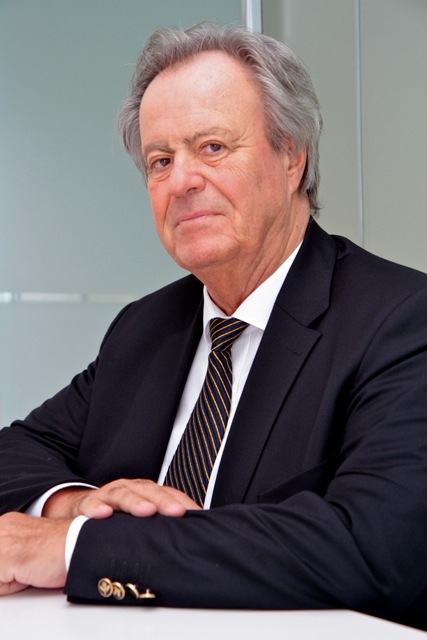 Photo: Nele Bendgens / Mallorca Zeitung
Photo: Nele Bendgens / Mallorca Zeitung
What is Fundamente Mallorca and what services does it offer to German-speakers settling in Mallorca?
This is an initiative to offer good information, solid advice and other services to German-speaking purchasers and owners of properties in the Balearic Islands. This target audience includes both residents and non-residents, since many German, Austrian and Swiss citizens have vacation homes or apartments here. They share one problem. They are lacking reliable information about important topics.
What aspects must a German citizen consider when deciding to establish residence or locate their investments on the island?
It can also be summarized this way. In the beginning, they may be too trusting, and after their first bad experiences, they distrust everyone. Also, many are not aware how differently things work. This is certainly not only in the area of laws or taxes, but also in construction techniques, for example. Our main recommendation is to seek the type of advice that is justly the product of Fundamente Mallorca. This is a mix between general and specifically regional information. For example, the technician who handles a problem with humidity in the walls must not only have expert skills, but also know the particularities both of the climate of Mallorca and of the customary construction techniques in the island. The foreign owner needs more support, beginning with less knowledge about practically everything related to the region, and lacking a social environment to advise, counsel and faithfully recommend people or companies that really work.
What is your role in the organization and what are its challenges for 2015?
I am a partner and administrator of European Accounting, a tax advisory company working for more than 15 years almost exclusively with foreign residents on the island. Through my very close relationships with many clients, I learn of every type of problem, not only tax issues. I came to some conclusions and proposed to five companies of recognized prestige, including Bufete Buades, to be part of the “hard core” of Fundamente Mallorca. I promoted the project with my team and this team provides the necessary support. Our greatest challenge in the beginning was positioning ourselves as a partner of reference to German-speaking owners.
The year has just begun, bringing new legislative and tax changes. Which of these can most directly affect new foreign residents in Baleares?
Without a doubt, it is the reform of the rent law, because it directly affects taxation on transfer of properties. In this case, however, veteran owners are the most affected. According to the circumstances, taxation can be reduced a bit or peak dramatically. The latter can occur in the case of the sale of a property purchased before 1994 at a very low price. There are also important variations in the new procedure to substantially modify land registry values through updating coefficients, taking place this year for example in the municipalities of Marratxí, Calvià and Andratx.
Economic indicators seem to show that we are coming out of the crisis. Have you noticed a change in the capacity of investment and generation of economic activity of the German-speaking citizens interested in residing in Mallorca?
In early 2013, we began editing a book directed to the Swiss market, describing the reasons that investors should consider Spain and Mallorca. We surveyed clients about our theory, and no one wanted to know anything about all this. However, by then, the “smart money” had already begun to purchase assets discreetly in Spain. Just when the book came out in autumn of that year, the public was already taking note of the first signs of recovery. From then the interest of the investors has boomed. There is a clear and sustained change in trends but only regarding investments. The attitude toward settling in Mallorca is somewhat different. According to some measures such as model 720 and taxes on assets, many of Mallorca’s biggest fans prefer to settle or keep their residences abroad. There is still much to be done. We and our partners look forward to the challenges.
In good handsWith its International Desk, Bufete Buades always looks after its clients in their own language, guaranteeing a comprehensive service.
As a result of its constant efforts since 1979, Bufete Buades has become a benchmark company in Majorca. Our constant aim is to be able to meet our clients’ expectations of the firm and repay their confidence. In order to achieve this we constantly strive to improve our service, helped by our considerable ability to modernise by constantly adding innovative elements to our traditional working tools and by integrating highly qualified professionals in our team.
Bufete Buades has clients of all types, thanks to its size and experience, from start-ups and small entrepreneurs to major international businesses and family businesses for whom we act as family office. Our working philosophy is based around understanding our clients, putting ourselves in their shoes and offering them ideal solutions based on their particular situation. Our lawyers’ greatest satisfaction is when with their help a client can, for example, open a new residence following the appropriate planning and/or legal procedures that they have recommended.
As a result of this, new departments are created in the practice as requirements change, such as the International Desk which is the result of continued demand for this specialist service from Bufete Buades’s clients. Our clients wanted to be able to call on a team of specialists with the highest levels of expertise, whose role in providing comprehensive advice would take shape while their initial legal needs developed into different or complementary ones during the process. This service is always offered in the client’s own language in order to tailor it to his or her own requirements.
This area of the practice consists of lawyers and administrative staff who combine their legal skills with a high standard of English and German. In the practice we particularly appreciate the importance of knowledge of foreign laws, life-styles and customs. Several of our lawyers have spent years living in Germany and in English-speaking countries, and have obtained Masters of Laws from prestigious institutions such as the Humboldt Universität zu Berlin or the Universität Hamburg.
With the help of Bufete Buades’s International Desk our clients can approach any matter relating to investment, property, planning and commercial law with confidence and security, and can also rely on the support of the rest of the professionals working for the practice. This will help them to feel protected by a practice which treats its clients’ cases as though they were its own, and does so in a personalized and professional manner.



